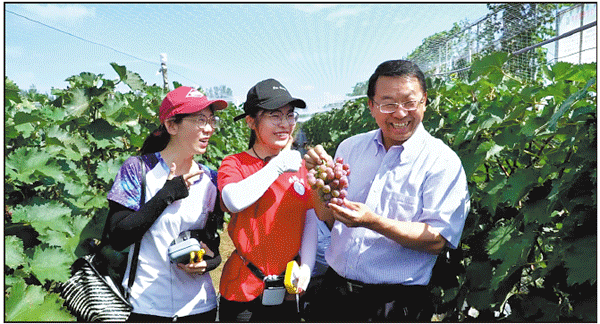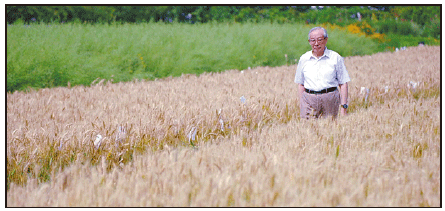Documentary shows fieldwork of three generations in Hebei
A group of young people labored in the countryside in Quzhou county, North China's Hebei province, planting grapes. But when they recorded data about their growth, they were soon disappointed when they found some of the grapes were affected by a downy mildew, before they enjoyed the final harvest of the remaining fruit.
The young people are students from the China Agricultural University, and they are not the only generation from the educational institution to have slugged it out in this area.
A TV documentary, University on the Field, premiered in Beijing on Sept 20, and it tells the story of three generations at the university who strived to promote agricultural development in Quzhou.
According to Shi Yuanchun, an academician at the Chinese Academy of Sciences, who was one of the first members of the institution to have worked in the fields of Quzhou: "It is a long but exciting story."
The documentary's story starts in 1973 when Shi, Xin Dehui and some other teachers at CAU were appointed to make use of a patch of wasteland in Zhangzhuang village in Quzhou.
They lived in poor conditions but made great progress in their work after repeated trials. Their experience in improving the quality of saline and alkaline soil was later extended to the entire county, and then on a larger scale across China. Shi and Xin won the first prize of the National Science and Technology Progress Awards for their contributions.
When the soil was ready, the second generation led by Zhang Fusuo and other teachers from CAU went to Quzhou to "pursue high yield, high efficiency and sustainable development". They did test trials to explore new technology for planting crops, and what they developed was later used on other farmlands in China.
The third generation, represented by Wang Xiaoyi and Yang Yanling who were required to work in a testing facility known as the "scientific and technology courtyard" in Quzhou for two years, are still writing their own stories about Quzhou.
At the premiere, Shi, now 88, recalled the work he and his colleagues undertook there, which started 46 years ago. Shi said he and his wife, Li Yunzhu, went to Quzhou at that time and stayed there for at least eight months every year. They had to leave their two children at home in Beijing to be cared for by neighbors.
He has mixed feelings about his work decades ago.
"As a simple teacher, I was lucky enough, since I could combine my career with helping China's development. I always felt the value of my work, so I can say I didn't waste my life.
"I feel a little ashamed for (neglecting) my children, although I didn't let the people of Quzhou down," Shi says.
For members of the younger generation who are now working in Quzhou, the feeling is different.
"Since I grew up in the city, I felt uncomfortable having to stay in the countryside in the beginning. But then I began to enjoy my life there. Local people touched me with their kindness, and I learned so many things that I might never have learned in the city," Wang says.
Wang was required to work in Quzhou for two years according to the cultivation plan of CAU's College of Resources and Environmental Sciences. She started her work in March 2018 and was made responsible for testing and promoting advanced planting technology for grapes.
"When I watched the documentary, I realized the value of our work there," Wang adds.
Zhang Tongdao, the documentary's director, said his team spent 14 months shooting in Quzhou. They worked very hard since they had to shoot during the day and organize the material and prepare for the next day's work at night.
As a Quzhou local, Zhang says he felt honored to have made the documentary.
"I have directed films for over 20 years, and each one was made with a great deal of interest and effort. But this one is especially important to me. The CAU teachers and students have changed the destiny of many Quzhou people, so I wanted to shoot this to show my gratitude to them," he says.
"We spent so much time on it, but I was always afraid that it wasn't enough. Although the story was very good, I had to make sure that our cinematic expression was good, too."
Zhang says he learned from the people featured in the documentary, especially the scientists who helped the county with their fieldwork.
The documentary runs for two 50-minute episodes and was aired over the weekend on CCTV 9.
wangru1@chinadaily.com.cn
|
Wang Xiaoyi (left) and Yang Yanling (center), students of the China Agriculture University, check the grapes they planted in Quzhou county, Hebei province, with their teacher, professor Zhang Fusuo. |
|
Shi Yuanchun, an academician at the Chinese Academy of Sciences, was one of the first members of the institution to work in the fields of the county. Photos provided to China Daily |
(China Daily Global 10/10/2019 page15)




















